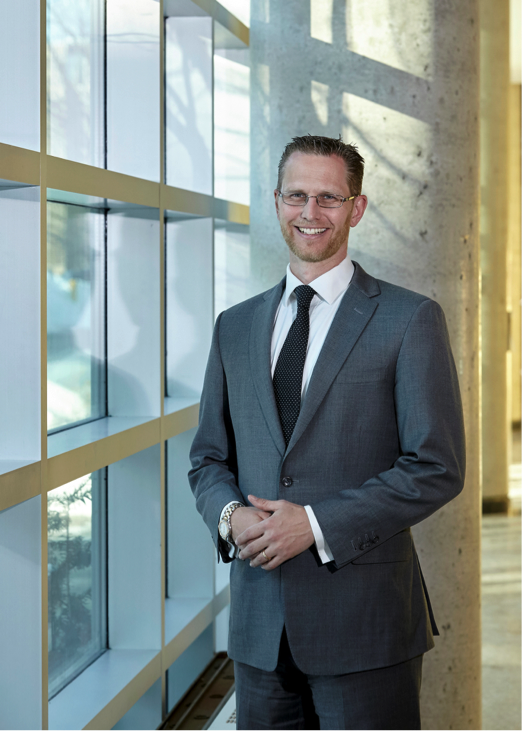Author: Elizabeth Krawczak

Date: Thursday, February 12, 2015
Time: 8:30am
Location: Women’s Health Concerns Clinic, St. Joseph’s Healthcare Hamilton
Faculty: Ryan J Van Lieshout, MD, PhD, FRCP(C) Albert Einstein/Irving Zucker Chair in Neuroscience,
Assistant Professor, Dept of Psychiatry and Behavioural Neurosciences,
Associate Director, Neuroscience (MiNDS) Graduate Program
In the midst of his busy schedule, Physician, Assistant Professor, and founder of Brain Waves, Ryan Van Lieshout, sat down with me for an interview. His latest accomplishment, a publication in Pediatrics, highlights his passion for understanding the developmental origins of psychiatric disease in adulthood.
Q. What initially drew you to the MiNDS program and how did you become a part of it?
A. During part of my residency training, I did a graduate degree in the health research methodology (HRM) program at McMaster. Being at McMaster, I was aware of the Neuroscience graduate program. The HRM program is not an interdisciplinary graduate program per se, but there are individuals from respiratory medicine, cardiology, neurosurgery, and so forth and I loved its interdisciplinary and collaborative nature. So, when I learned more about the Neuroscience program, I saw that it offered that same interdisciplinary bent and allowed me to interact with people in the basic science world, which I think complimented the things that I did well.
In MiNDS, you have the opportunity to work with people in this interdisciplinary environment and students have the time and flexibility totake the courses that they need to meet their goals, but also have the time todo their research and explore career options. These were the major draws for me.
Q. What are you currently working on, research wise?
A. We recently published a paper in the journal Pediatrics looking at the neuropsychiatric manifestations of being born at an extremely low weight in the fourth decade of life. This was an important paper for us and it has garnered a fair bit of popular press and public interest. We are continuing work on this extremely low birth weight cohort and are looking at questions examining how early life exposures affect the risk of psychiatric disorders 20 to 30 years later.
The second set of things we’re looking at is the neurodevelopmental outcomes in children born to women participating in a randomized control trial (RCT) of a diet and exercise intervention for pregnant women that Dr. Stephanie Atkinson in pediatrics is running. My hypothesis is that if you provide such a high quality intrauterine environment, children will have higher IQ scores and better emotion regulation compared to the children of women who get regular pregnancy care. It’s really a study looking at how we can get children the best possible start in life.
Q. What three qualities make you a worthwhile supervisor?
A.I think that, first and foremost, it is because I really like teaching and working with students. The second thing is that I have regular meetings with them to go over their progress and discuss their ideas and thoughts. I make sure I am available to them and do my best to be responsive. Third, I also have a fair bit of experience in a number of different areas, ranging from early neurodevelopment, to adult psychopathology, to statistics and methodology, as well as an understanding the molecular underpinnings of these things.
Q. And what criteria do you have for choosing the students you work with?
A. Students who work with me need to be hardworking. They need to be conscientious. And they need to take pride in their work. If a student has these basic three qualities, then the substantive and methodological skills are easy to teach.
Q. Do you have a role model, anyone you are looking up to right now?
A. There are several, depending on whether I’m thinking about my research, clinical, or administrative work. Research and career wise I think it’s probably Drs. Louis Schmidt and Michael Boyle (my former PhD supervisor). They really do things the right way–they don’t cut corners and they’re really good people, in addition to being successful.
Q. What has been the most humbling lesson you’ve learned so far in your research career?
A. In terms of research, I think not having my first ten or eleven grant applications funded. That was humbling, as I don’t think I expected that. But that particular set of setbacks helped me realize that sometimes it’s a numbers game and it’s a learning experience. You always need to be trying to find new ways to evolve and improve. It can be tough and if you want to be in academia you need to have (or develop) a thick skin. So, I think for students it’s important to learn to persevere, stick with things, and believe in yourself.
Q. Finally, I recently read an article in McLean’s magazine entitled “How your brain heals itself”. The message of the article was that “the brain is as ready to unlearn as it is to learn”, that“ the brain can–if not always cure–heal itself”. Of course we’re talking about neuroplasticity. The article highlights cases such as a women suffering from MS recovering her voice, or another woman with Parkison’s learning to walk again. How have you experienced the brain’s ability to recalibrate itself in your work?
A.I think the message of the article, first off, is very positive. However, I think there are limitations to how much the brain can heal itself. Although the message is wonderfully positive for the public, it has to be taken in context because there are limitations to what science and medicine can do at this point in time.
Personally, working with extremely low birth weight survivors, and looking at the extreme adversity that they were exposed to, both prenatally and in early postnatal life, and then seeing how they’ve become productive, happy adults has been so impressive. They were born at the edge of viability and have gone on to be such joyful and productive people.